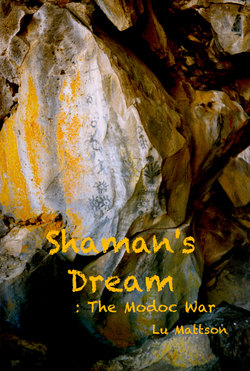Читать книгу Shaman's Dream: The Modoc War - Lu Boone's Mattson - Страница 72
На сайте Литреса книга снята с продажи.
#68
ОглавлениеIt was like tracking a deer, one that was gut shot, with no bleeding outside. Usually you had to figure out where to find him, think where he would go to die. But sometimes you just knew it, could go straight to the place without any tracking and find him waiting for you. Inside, eating at him, the bullet or arrowhead would be causing the black bile to spill into the body cavity. And you could only find it when the deer was finally dead and you thrust your knife through the thick skin and let the guts rush out onto the ground. Then you could see why the deer died. Its tongue showing somewhat through the side of its mouth, its still-opened eye going glassy.
That was how the kiuks looked and how he died. Inside he was all black bile, the same poison he had shot into the girl filling him, too, so that his face showed it, and his throat, the engorgement. It had been just one knife thrust after they shot him, and he took it.
No telling why Compotwas Doctor had done what he did, who had put him up to it. Keintpoos would have to watch now, see if any other of his family sickened, or if he himself ran onto signs someone was working against him. Maybe someone who stayed behind on the reservation when he busted loose. Maybe even someone who went with him. He thought of John Schonchin and Black Jim, always telling his boys to go raiding; Curley Headed Doctor who even counseled war. Maybe it was Hooka Jim. He would have to watch them for some sign.
At dawn, they had hauled the shaman’s body all the way back to the reservation and dumped it, he and Walcaumchuks and Boston Charley. They left it there outside the relatives’ place, where the dogs would find it, and the family. But the coyotes wouldn’t. So they could burn it, the family, just like his people had burned his niece, on the raised stone and sand bed. Burn it-- or bury it if they wanted to, now that they were reservation Indians.
And all would be done then, at least for the time being.
There would be more to it later, he knew, but he didn’t know what. You didn’t kill a shaman so easy, even if you had to. One year, they said -- and he knew it to be true, one year and you were dead for doing it, even if he had it coming. He calculated:
Now was the water-lily time, after the birds had taken off from the lake, gone up toward The Dalles and maybe further since the cold had let go. Now was the time of Sun bringing everything back: the grass, the choke-cherries and plums, the young. There would be the season of ripening and gathering. There would be the running of the mullet and the drying of them on the big racks. Then the birds would come back, riding in front of the cold wind, landing in white wave upon white wave all over the surface of the water, far as you could see, mixed in with the little teals and ducks that never left. And then would be the time for them all to hurry up and get the wocas put away, the water-lily seeds cached against the storms, the jerked deer and beef and antelope packed up and laid into the stone caches where they could get at it easy, but the animals couldn’t. Time to pull back, too, to the permanent camps, letting the summer mat and reed houses go. Settle down to sleep long nights and listen to the stories that never seemed to stop in the earth houses, days and nights of them, old ones. While the ice crusted over the pond edges and the snow came. A skiff of it at first, then more, but usually not enough to cover the rocks for long or much. The wind would whistle it away -- the witsduk-- and pile it in the lee of some ridge, but then Sun would finish it off, and finally it wouldn’t come any more. Just a little cold rain, then, to say the time was changing; not much, not long. Just some. And then would be the time for waking up the grasses again, for the green that spread over it all, held for a few days, then faded. Time enough then for him to reckon the round had been almost completed.
But not yet. For now he would forget it. There were other things he had to think on, other things he must get on with. He thought toward the sweating he now must do to wash himself from this insofar as he could; to get straight again. In the early morning light -- as the dogs came shuffling stiff-legged out from the cluster of houses and shacks toward them, sniffing up into the cool morning air -- after they had dumped the body, he turned his horse toward the south, back off the reservation, toward Lost River. In his mouth was the taste of the sleepless ride up here, the grief of his sister, the bilious taste of revenge. But all was right, at least for now. It was the way, and he knew Compotwas Doctor would bear no grudge, even as he hated him. They at least had kept faith with one another. It was for the others to feel shame. Let them run around for cover, weasels afraid of this hard kind of truth.
The tyees would think something about this, but he did not know what it would be. He wondered about it as he turned his horse away from Sprague River, toward the Yainax Butte.
